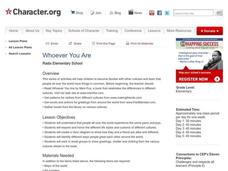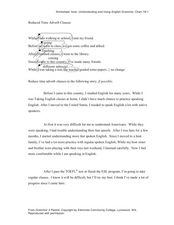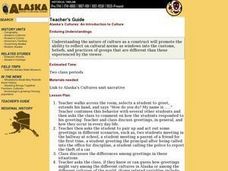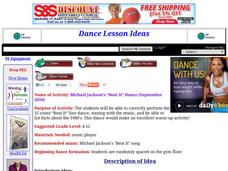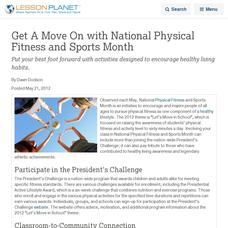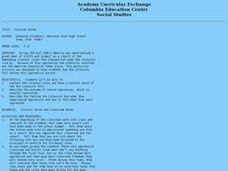Curated OER
Growing in Character
Young scholars explore how to build their character by respecting and appreciating various cultures. In this character education instructional activity, students read the book Seedfolks and answer questions based on the character's...
Curated OER
Whoever You Are
Students examine cultures, traditions, and feeling throughout cultures. In this cultural lesson, students use literature, maps, and cultural information to examine how people have universal feelings despite their different cultures and...
Curated OER
Stereotype Characters Activity
Here is a instructional activity designed for middle schoolers which helps them recognize stereotypes one way or another against a particular group of people. They also determine what may have motivated the author to use a stereotype in...
Griffen Publishing
Learning From the Past
The big idea for this lesson is that the past enriches our present and future. Learners explore the origin of the Olympic Games and how one man took an event from the past and reinvented it for modern times. They compare and contrast the...
Edgate
Learning From the Past: Origin of the Modern Summer Games
Where did our beloved Summer Games originate? Kids look for the origins of the Summer Olympics in our ancient past. They research how the Games came to be and how they have changed. They'll complete Venn diagrams to compare and contrast...
Curated OER
Topic Sentences
Here is a classic worksheet that allows learners to practice identifying topic sentences. They read five different paragraphs about various topics, and underline the topic sentence in each paragraph with a green crayon.
Curated OER
Reduced Time Adverb Clauses
Looking for a way to improve your students' writing conventions? Include this adverb clauses worksheet in your next grammar lesson. Middle and high schoolers read a three-paragraph selection and rewrite adverb time clauses to make the...
Curated OER
Auxiliary Verbs Exercises
In this gap fill learning exercise, learners fill in the blanks to sentences with do, does, doesn't, don't, am, is, are, or I'm. Students complete 45 sentences.
Curated OER
Science: When Autumn Leaves Fall
Students conduct Internet research to discover the reason why leaves change color in autumn. On a nature walk around school grounds, they collect leaves of various colors and shapes over a three-week period. finally, students select...
Curated OER
One Person's Trash
Middle schoolers pick an area that needs cleaning up and help clean up the trash in that place. For this clean up lesson plan, students pick either their home, school, or neighborhood to clean up and sort through the trash that they find.
Curated OER
What Is An Insect?
Second graders participate in a nature walk to observe various types of insects. As a class, they discuss the proper ways to collect insects without harming them and review a poster of insect characteristics. They sing a song about the...
Curated OER
A Walk in the Woods
Students observe an environment, ask questions about what they observe. and design experiments to answer one question they came up with in this upper-level High School or college lesson. The lesson requires an outdoor exploration or...
Curated OER
Building Words: A Walk in the Desert
In this building words worksheet, students use the letter tiles to rewrite each word according to the directions. Students write the new word in the boxes and start with the word mask.
Curated OER
Alaska's Cultures: An Introduction to Culture
Students examine aspects of culture in relation to greetings, practices and customs.
Curated OER
The Gingerbread Friend Is Loose!
Students explore the story of the Gingerbread Man, and compare the story's neighbors and neighborhoods with those of their school. They bake Gingerbread Friends cookies, retell the story, take a neighborhood walk, and create a class book.
Curated OER
Michael Jackson's “Beat It” Dance
Looking for a line dance? Look no further. This dance is performed to Michael Jackson's "Beat It". It is comprised of four eight-counts. The moves consist of walking forward, swinging the hips, doing the grapevine, walking backwards, and...
Curated OER
Michael Jackson's "Beat It" Dance
Learn this 32-count line dance. There are four eight-counts that repeat throughout the song. The steps include walking forward, walking backward, pivots, grapevine, and some jumps. All in all this is a simple and quick dance to learn....
Curated OER
Get a Move On!
May is National Physical Fitness and Sports Month. Get moving with lesson and activity ideas to encourage and motivate students today!
Curated OER
Science: Schoolyard Trees
Sixth graders choose specific trees to research while taking a nature walk around the schoolyard. They discuss tree and leaf parts and observe various types of leaves. After writing their reports, 6th graders present them to the class...
Curated OER
Weathering and Erosion
Fourth graders take a look at the effects of weathering and other geologic activities found in the environments in which they live. Along with a guided geologic walk outside of campus, there is also an effective in-class demonstration of...
Curated OER
Rooftop Gardens
Second graders investigate how to help a city building remain cooler on the inside. They create a rooftop garden in order to shield the building and lower the internal temperature. The garden is meant to replace the black tar paper that...
Curated OER
Fact or Opinion?
Challenge your class to determine between facts or opinions in the following PowerPoint. Each section contains an advertisement with stated facts and opinions. This is a great game for learners to play individually or with partners.
Curated OER
Prepositional Phrases
What is a preposition? You can't possibly understand prepositional phrases without first learning prepositions. Start by reading the informative paragraph at the top of the page. An example is also included. This is a great introduction...
Curated OER
Colonial Rules
How did Colonists react to British rule prior to the American Revolution? Give your high schoolers a taste of oppression with this role-play activity, then let them come up with a revolution of their own. This excercise is intended to...



